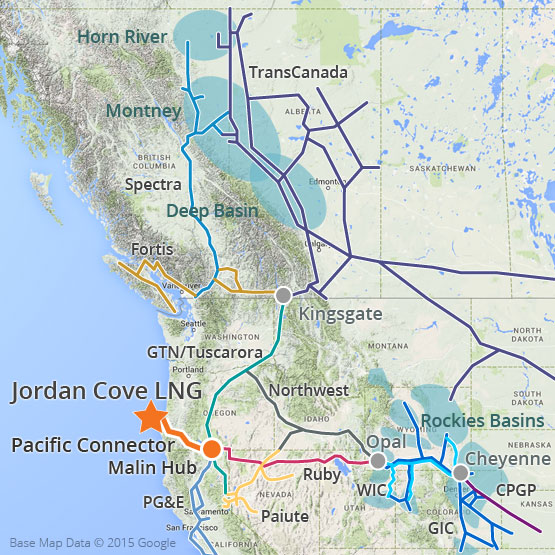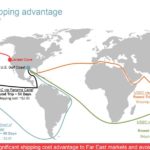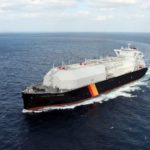FERC has rejected plans for a pipeline that would supply Jordan Cove LNG
The Federal Energy Regulatory Commission released its decision on the Pacific Connector Pipeline project March 11, saying that it will not approve the pipeline. The $1.74 billion pipeline was planned to carry gas from Rockies 232 miles west to Veresen Inc.’s (ticker: VSN, VeresenInc.com) Jordan Cove LNG project in Oregon.
The FERC wrote in its report that the pipeline, which would be built in partnership with Williams Partners LP (ticker: WPZ, Williams.com), did not display enough benefits to outweigh the “adverse effects on landowners.” Without a pipeline to feed the first LNG export terminal on the West Coast, the future of Jordan Cove is now uncertain as well. Now that the construction of the pipeline has been denied, Jordan Cove “can provide no benefit to the public to counterbalance” the impacts associated with its construction, according to the FERC.
Calgary-based Veresen said it was “extremely surprised and disappointed” by the decision and plans to request a rehearing.
“The FERC appears to be concerned that we have not yet demonstrated sufficient commercial support for the projects,” said Veresen President and CEO Don Althoff. “We will continue to advance negotiations with customers to address this concern,” he said.
While Veresen has estimated in previous presentations that the Jordan Cove terminal would cost $5.3 billion, a report issued by the federal energy commission’s staff last year estimated construction would total about $3 billion.

Global natural gas supply glut making economics uncertain
Jordan Cove is the first LNG project to be denied since the massive increase in natural gas production from the shale boom. The FERC has approved at least seven export plans as of January 6, 2016, and was weighing applications for nine more, including Jordan Cove, reports Bloomberg.
With natural gas prices at historic lows, companies are having a harder time making their case to the FERC about the need of more LNG export projects.
“The more adverse impact a project would have on a particular interest, the greater the showing of need and public benefits required to balance the adverse impact,” the federal energy commission said in its order.
The company showed “little or no evidence of the need” for the Pacific Connector pipeline considering the companies had not conducted an open season for capacity on the system and did not have contracts for it, the FERC said.
Important disclosures: The information provided herein is believed to be reliable; however, EnerCom, Inc. makes no representation or warranty as to its completeness or accuracy. EnerCom’s conclusions are based upon information gathered from sources deemed to be reliable. This note is not intended as an offer or solicitation for the purchase or sale of any security or financial instrument of any company mentioned in this note. This note was prepared for general circulation and does not provide investment recommendations specific to individual investors. All readers of the note must make their own investment decisions based upon their specific investment objectives and financial situation utilizing their own financial advisors as they deem necessary. Investors should consider a company’s entire financial and operational structure in making any investment decisions. Past performance of any company discussed in this note should not be taken as an indication or guarantee of future results. EnerCom is a multi-disciplined management consulting services firm that regularly intends to seek business, or currently may be undertaking business, with companies covered on Oil & Gas 360®, and thereby seeks to receive compensation from these companies for its services. In addition, EnerCom, or its principals or employees, may have an economic interest in any of these companies. As a result, readers of EnerCom’s Oil & Gas 360® should be aware that the firm may have a conflict of interest that could affect the objectivity of this note. EnerCom, or its principals or employees, may have an economic interest in any of the companies covered in this report or on Oil & Gas 360®. As a result, readers of EnerCom’s reports or Oil & Gas 360® should be aware that the firm may have a conflict of interest that could affect the objectivity of this report.







